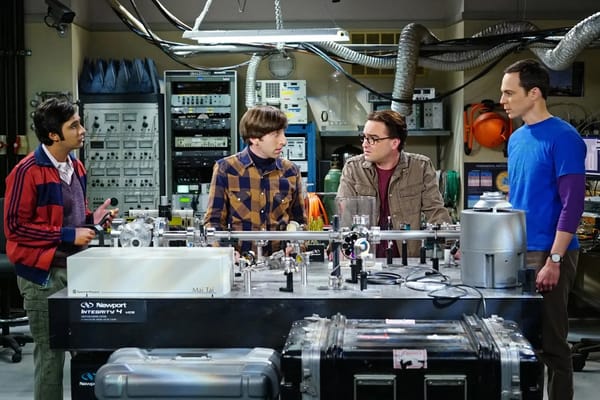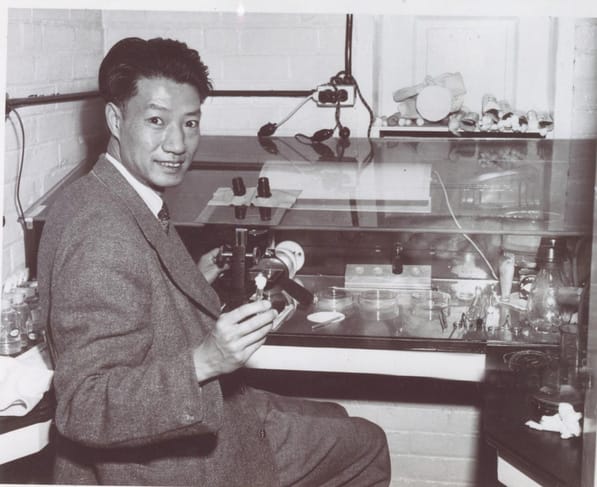Money Makes the World Go 'Round – But It Can't Change Its Axis of Rotation

“Investing in software with no due diligence worked, but it’s probably not going to work in the future...more and more early investment is going to be fundamentally in...different science, it's going to require underwriting the science behind these entrepreneurs...I believe it's going to be much more in hard science that requires a lot more technical understanding.” - Larry Fink, CEO of BlackRock
In the last few weeks, we have covered:
- How the decline in government funding in conjunction with the rise of software-focused venture capital investing has led to a lag in scientific innovations
- How AI is a new “how” that will unlock new sectors to become venture backable, such as ScienceTech (or SciTech)
- How “science” has become increasingly “venture backable” – based on the numbers
Leading us to this final question: Are VCs equipped to judge these “science projects”?
As we discussed last week, the potential of science-related startups has become increasingly obvious. And VCs have noticed.
In the last decade, we have seen a steady rise in funding for science-related technology – nearly doubling from 12% of venture funding in 2013 to 28% in 2023 – that’s more than 2x. For specific focuses, the increase has been even more dramatic:
Hydrogen energy technologies, 8.3x
Quantum computing, 3.2x
Battery technologies, 4.4x
As the proportion of allocations increases, the ability for VCs to pick “science” companies becomes increasingly important. But, like Larry Fink and Andrew Ross Sorkin pointed out at DealBook Summit 2022, venture capital firms are just not ready.
Venture capitalists invest in a large number of opportunities expecting more that 80% of them to fail – and the rest to generate all the returns. That’s just the probabilistic risk. Combined with an acceleration of capital deployment in the last decade, this mindset has led to a deterioration of proper diligence.
That has seemingly fared ok with software companies, where capital can make companies. You can put more capital into a company to will it to an exit, from Uber to BlueApron to Lemonade to MetroMile to WeWork (kinda).
But “science” companies don’t work like that.
You can’t will gravity to change with capital.
You can’t will electrons to behave differently with capital.
Because with science there is a hard reality of what is actually doable.
And charismatic CEOs who tell compelling stories cannot bend science to their will regardless of how titans of industry see themselves.
So, many “science projects” have failed – not because science has higher risk, but because the VCs invested in “science fiction.”
Pathway Genomics
Momentus
Theranos
Great stories, huge market opportunities, compelling founders… but ultimately science fiction, nonetheless.
VCs are always hunting for the new and the disruptive – and thus have a tendency to rush into new fields of opportunities and become self-proclaimed “experts” via “deep dives” in <3 months. While this may work with software-centric companies built on existing proven technologies addressing new sectors, you just can’t do that with science. Some foundational knowledge and experience is important to tell science from pseudoscience from utter science fiction. (And perhaps that’s why some of the top Biotech VCs have partnerships composed of MDs & PhDs – but again, Biotech is for another time.)
I mean, how do you tell if an enticing sounding opportunity is too good to be true or just plausible enough to take the risk?
Self-propelled vacuums shaped like frisbees?
Engineered fabrics that heat/cool on command?
Palm-sized drones that can lift a refrigerator?
Swarms of nanobots?
Autonomous gene editing on a chip?
Cobalt mining on the ocean floor?
Precious metal mining on an asteroid?
You have to understand the underlying science. IYKYK.
So, I went digging, starting with Deep Tech VCs, presumably the most science-savvy (again, excluding Biotech).
We started by compiling a list of over 200 Deep Tech VCs and assessed the composition of their partnership.
We consider a partner “science-savvy” if they have any advanced degree in sciences (M.S. or Ph.D.) or a research-centric M.D., have on-the-job research or engineering experience, or are credited for multiple scientific patents and/or publications. Not super strict. And we consider a partnership predominantly science-savvy if 60% of the partners are science-savvy. Because we know what being a minority voice in a room feels like, and one scientist can’t overrule a majority decision to invest even when they know – and have the data-driven proof – that the science will fail.
First, the lay of the land. In 2024:
- 50+% of the US Deep Tech VCs are pre-seed/seed firms writing <$3M checks
- 30+% of the US deep tech VC firms are early-stage focused, deploying up to ~$10M checks
- ~15% of the US VC firms investing in deep tech are late-stage focused
Pre-seed/seed firms tend to have advanced science backgrounds. They also tend to have strong affiliations with research or academic institutions. This makes sense. Deep Tech’s focus on a new discovery or a new application of science means an early phase of R&D that relies on a VC partnership composed of more scientists and academics that collaborate with founders to prove the science.
On the other end of the spectrum, late-stage firms don’t really need as much science expertise. Only 5% of the firms have predominantly science-savvy partnerships. But that’s OK, because companies at this stage typically have proven that their science is real and in the market. And the VCs are investing in these companies from more of a financial lens.
But what about 30%+ writing $3M-$10M checks?
Guess what proportion of partnerships are predominantly science-savvy?
Only ~10%
Even I was surprised.
The funding by these early-stage VCs is vital to the companies getting to $10M in revenue – the marker that we previously discussed as the crucial milestone.
What this means is that, the fate of many of these science companies in their most crucial stage of funding may be determined by people who haven’t seen the inside of a science lab since high school.
Let that sink in.
So are “science projects” too risky for venture?
Or maybe we just don’t have enough of the right VCs looking at these deals?
Unsurprisingly, this won’t stop VC firms from operating as they always have with a mentality that 80% failure rate is normal and acceptable regardless of whether those risks were avoidable based on the validity of the science. But it will temper their ability to make those proverbial f-ton of money we’ve been talking about these last few weeks.
And that will ultimately affect VC science funding as a whole.
Because the category will be blamed.
And not the VCs who let us down.
But here’s the positive spin: what those VCs can’t see properly are just more opportunities for those who can.
Readings:
Payload, “How Momentus Became The Latest SPAC On The Rocks”
Pseudoscience vs Innovation “Silicon Valley is confusing pseudo-science with innovation”
VC funding volume: Dealroom.co "Global Tech & VC Q3 2023"
Council on Foreign Relations, "Innovation and National Security: Keeping Our Edge"
Medium, “Deep Tech Investing on the Rise”
BCG "Deep Tech: The Great Wave of Innovation"
Watch Larry Fink and Andrew Ross Sorkin at Dealroom 2022 here:
https://youtu.be/PSVpth7uqb4?si=JSrKObi3BS1a5YJY




